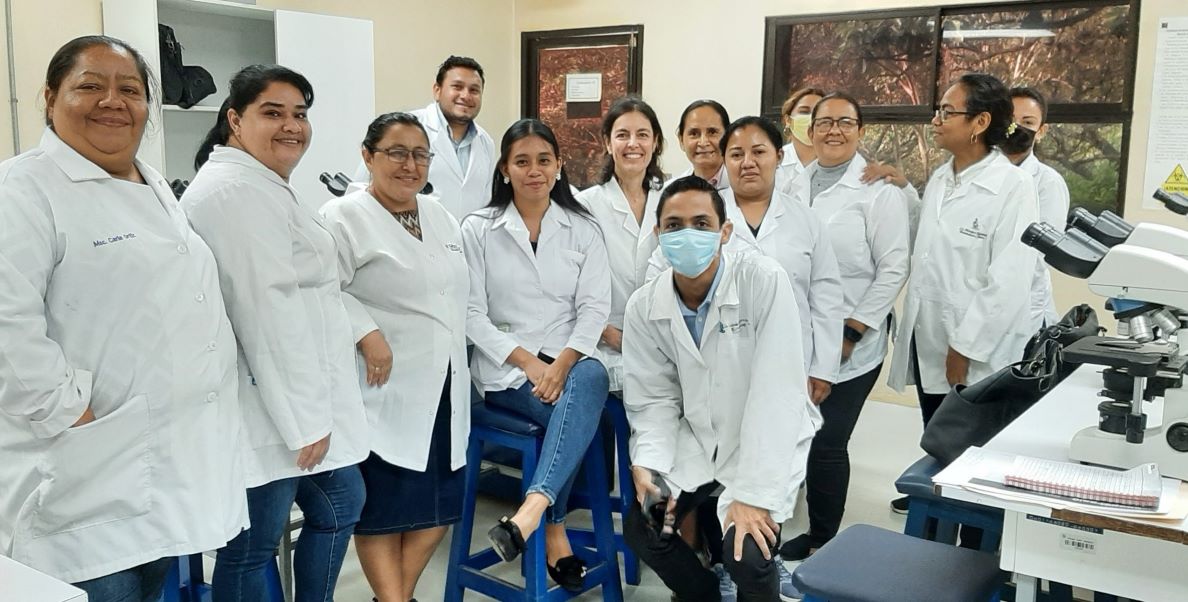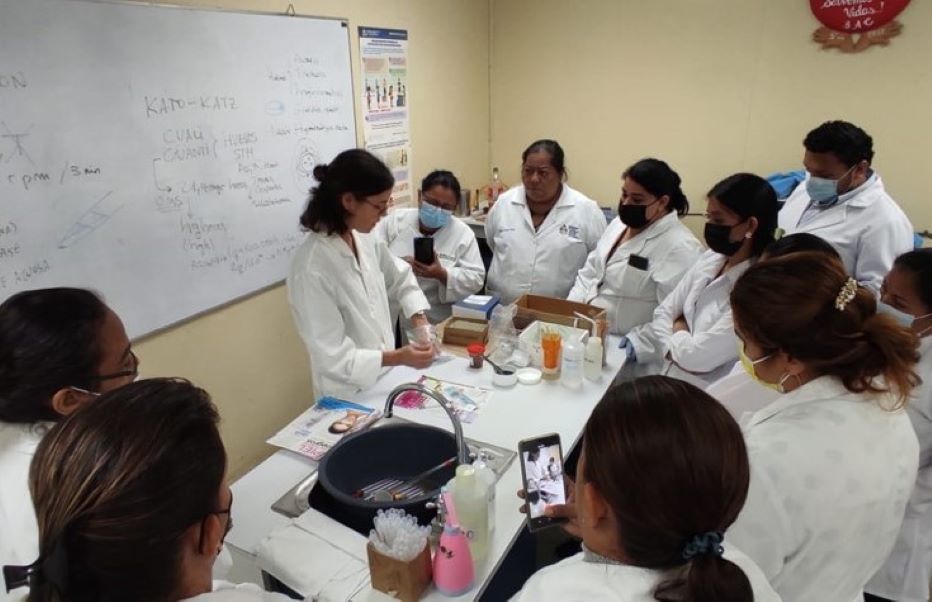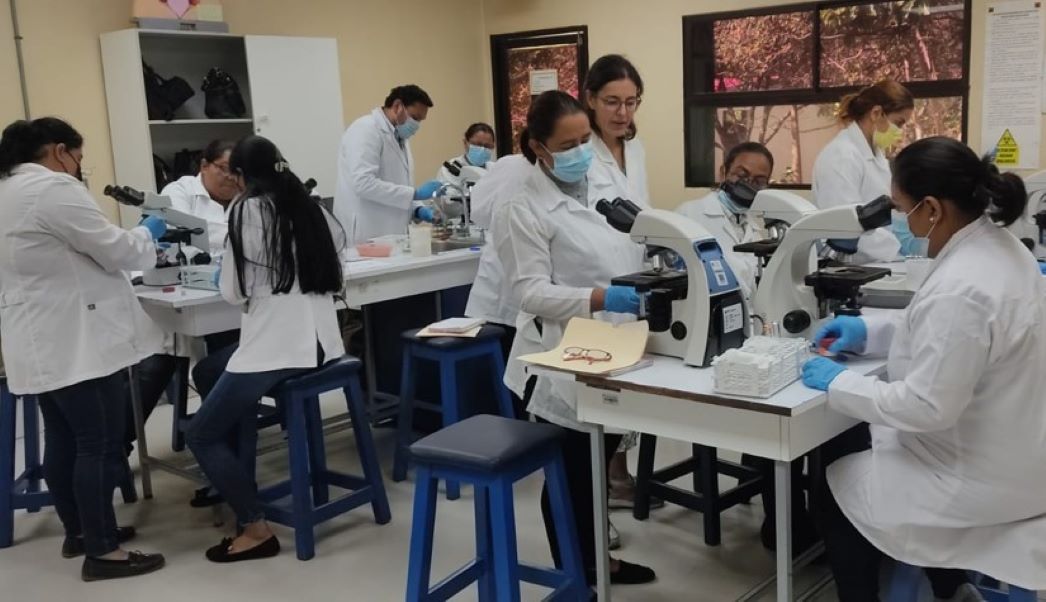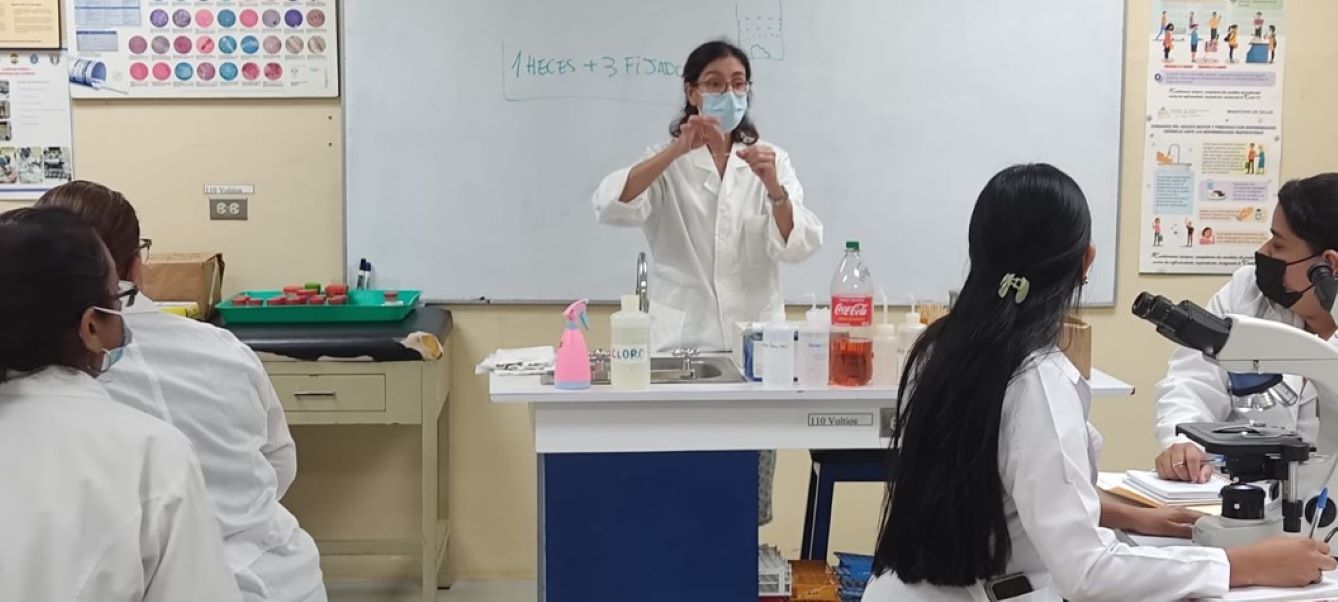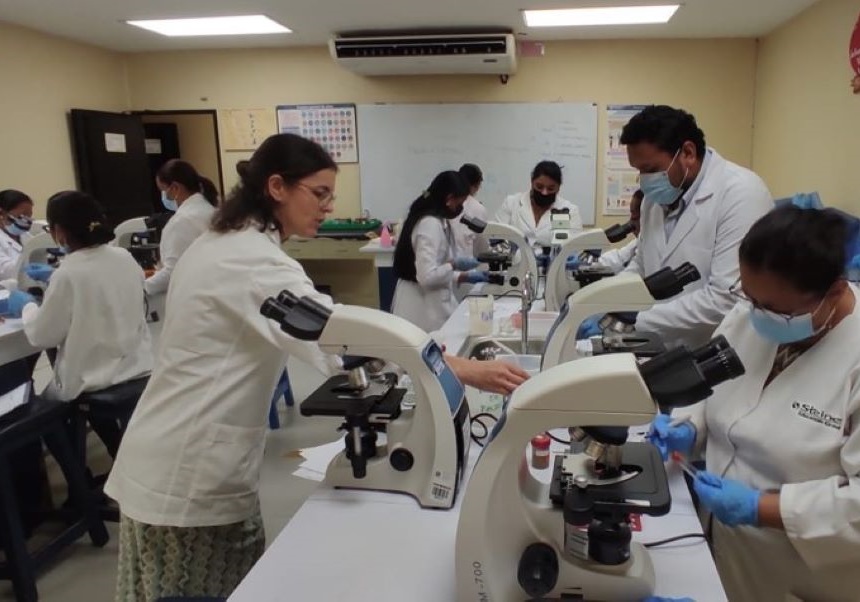
| Responsible | Muñoz Antoli-Candela, Carla | |
| Country | Nicaragua | |
| Contribution | 13.500 € |
GOALS
- Firstly, it was agreed with the local partner to start with a theoretical/practical course/workshop, to explain the specific techniques, updating them on reagents, instrumentation, methodology, etc. The explanation of the theoretical notions was accompanied by some practical lessons to ensure their applicability, skill and training in these techniques. In total, they were trained and updated in a total of 6 coprological diagnosis techniques (Kato-Katz technique; Ziehl-Neelsen technique; trichrome technique; molecular DNA extraction techniques; purification technique; sequencing technique) with different degree of complexity and with different degrees of learning, interpretation and validation. The entire delivery of the course, both the theoretical part and the practical part, took place at the UNAN facilities in Managua.
- Secondly, it was agreed with the local partner to apply the specific techniques learned on the real population. Thanks to the processing and permits obtained by the local partner, as well as the population priorities to be studied expressed by the MINSA (Ministry of Health of Nicaragua), it could be applied in the field and, finally, there were two types of population for evaluate the diagnostic techniques learned. Thus, on the one hand, older adults suffering from chronic diseases were selected as a potential population, all of them patients at the “Dr. Alejandro Dávila Bolaños Health Center” in the Department of Masaya. On the other hand, the child population residing in three neighborhoods of Corinto in the Department of Chinandega on which no previous intestinal deworming treatment had yet been applied was chosen. Thus, volunteers were requested from among the students attending the course, so that two teams were formed. One would be in charge of caring for the chronic elderly users of the Health Center and another would be in charge of going house to house to care for the population under 15 years of age. Both the local partner and the person responsible for the project would accompany the respective teams, in shifts, so that any problems that may arise would be attended to at all times. In any case, the course students themselves would be in charge of properly handling the real population, requesting the type of sample necessary to be analyzed, preparing and properly fixing said sample, and, subsequently, carrying out the appropriate diagnostic techniques.
ACTIVITIES
- First, UNAN Managua was provided with the necessary inventory material to be able to apply the techniques that were going to be explained in the subsequent course/workshop: thanks to the provision allocated to the inventory item, a total of 2 optical microscopes and 1 a microcentrifuge. The acquisition was made in local companies from Spain, making payment through foreign currency, so that delivery was made directly at the UNAN facilities in Managua;
- Secondly, thanks to a Mobility Aid from the UV, the person responsible for the Project was able to make a first trip to Nicaragua (from September 24, 2022 to October 3, 2022). Likewise, thanks to the existence of an Agreement between UNAN Managua and the UV, the accommodation and maintenance of the person responsible for the project was provided by the UNAN Managua protocol house. In this first visit, the opportunity was taken to present the acquired inventory material to the academic authorities, put said inventory material into operation, hold the necessary institutional meetings, obtain the pertinent permits, try to solve the deficiencies and problems of applicability of the techniques to be taught in the course/workshop, restructure the planning according to the conditions and reagents that would finally be available, organize the analytical process that should be applied during the course/workshop, etc. In addition, an advance payment of 1000.00 USD was given to the local partner to be able to cover and advance the acquisition of consumables to be used during the course/workshop. To do this, a list of consumable materials was prepared to be acquired from Nicaragua by local companies and that would have to be available to students during the course/workshop. Likewise, the local partner was in charge of disseminating information about the course/workshop to be taught and appropriately selecting the participating students;
- Thirdly, thanks to the Project's travel allowance, the person responsible for the Project was able to make a second trip to Nicaragua (from January 16, 2023 to January 29, 2023) to teach the course/workshop and apply it in the field. Thus, 5 days were dedicated to teaching the course and another 5 days to evaluate its implementation on the ground in a real population by the students of the course/workshop. On this occasion, the person responsible for the Project had an advance payment of 3,600.00 USD.
FUTURE PLANS AND DEVELOPMENT PROSPECTS
- The beneficiaries will be mainly health personnel who will receive complete training in new forms of coprological diagnosis and, secondly, the evaluation of said training will cover a real population, who will benefit from knowing their health status at the level of intestinal parasites and receive the most appropriate pharmacological treatment.
- Furthermore, once all the analyzes carried out in Nicaragua have been compared with those carried out in Valencia, the parasitological results obtained will be communicated by the local partner to the Ministry of Health of Nicaragua to coordinate a control protocol, an appropriate parasitological treatment among those affected. by parasites, and parasite prevention with an adequate explanation of the health/environmental recommendations to the families themselves and the environment, so that valid information is transmitted and propagated for the entire community. These results and measures to be applied may be implemented by the Ministry of Health in the rest of the Departments of the Pacific zone of Nicaragua since they share the same characteristics in relation to climate, habits and customs.
- For all these reasons, the future plan would be to be able to continuously establish direct interaction with the MINSA, through Dr. Alberto Montoya, Director of the Department of Parasitology of the National Institute of Public Health of the MINSA (Nicaragua), who raised the possibility of a tripartite interaction between UV, UNAN and MINSA, so that MINSA resources are used thanks to the knowledge imparted by UV professionals, thanks to the existing agreements between UV and UNAN Managua. The possibility of postgraduate students being able to carry out research stays at the MINSA research facilities was also raised, so that the local staff could be enriched with protocols and methodologies, in addition to the possibility that, based on the results obtained, joint publications could be prepared.
- Finally, it is worth highlighting that the overall result of the project has been considered a success at UNAN-Managua, so that they have awarded me an Honorary title as a distinguished visitor, for the invaluable scientific and professional contribution offered, strengthening ties of friendship and cooperation, related to Higher Education that must be maintained in the future.
Images:



